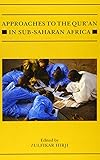Approaches to the Qur'an in Sub-Saharan Africa / edited by Zulfikar Hirji.
Material type: TextSeries: Qur'anic studies series ; 19.Publication details: Oxford: Oxford University Press, 2019.Description: xxv, 543 pages ; 23 cmISBN:
TextSeries: Qur'anic studies series ; 19.Publication details: Oxford: Oxford University Press, 2019.Description: xxv, 543 pages ; 23 cmISBN: - 9780198840770
- 297.7/70967 23
- BP64.A37 A67 2019
| Item type | Current library | Collection | Call number | Status | Date due | Barcode | |
|---|---|---|---|---|---|---|---|
 Books
Books
|
Zetech Library - Mang'u General Stacks | Non-fiction | BP64.A37 .A67 2019 (Browse shelf(Opens below)) | Available | Z011243 |
Browsing Zetech Library - Mang'u shelves, Shelving location: General Stacks, Collection: Non-fiction Close shelf browser (Hides shelf browser)

|

|

|

|

|

|

|
||
| BL2400 .A453 2012 African traditions in the study of religion in Africa : emerging trends, indigenous spirituality and the interface with other world religions / | BM525.A52 .C65 2010 The book of concealed mystery : humanity, spiritual and physical / | BM535 .A58 1979 Antisemitism and the foundations of Christianity / | BP64.A37 .A67 2019 Approaches to the Qur'an in Sub-Saharan Africa / | BP130.4 .S45 2007 Approaching the Qurʼán : the early revelations / | BP134.W6 .W33 1999 Qurʼan and woman : rereading the sacred text from a woman's perspective / | BP165.5 .G36 2003 The Qurʼan and Islam |
Includes bibliographical references (pages 473-513) and indexes.
Tafsir sources in four annotated Qur'anic manuscripts from early Borno / Dmitry Bondarev--Qur'anic exegesis in Manding: the example of a Bamana oral commentary on Surat al-Rahman / Tal Tamari--Polemics and language in Swahili translations of the Qur'an: Mubarak Ahmad (d. 2001), Abdullah Saleh al-Farsy (d. 1982) and Ali Muhsin al-Barwani (d. 2006) / Farouk Topan--'A confirmation of what went before it': historicising the Shi'i Swahili Qur'an translation by Ali Jumaa Mayunga / Gerard C. van de Bruinhorst--A pious poetics of place: Islam and the interpellation of (im)moral subjects in Malian popular music / Ryan Thomas Skinner--And God will protect thee from mankind (Q. 5:67): a talismanic shirt from West Africa / Ruba Kana'an--Prayer, piety and pleasure: contested models of Islamic worship in Niger / Adeline Masquelier--By way of the Qur'an: appeasing spirits, easing emotions and everyday matters in Zanzibar / Kjersti Larsen--The woman who did not become possessed: the soul, spirits and ancestors in Tuareg cultural interpretations and uses of Islam and the Qur'an / Susan J. Rasmussen--Women who are men: Shaykha Maryam Niasse and the Qur'an in Dakar / Joseph Hill
Fi Lawhin Mahfuz: towards a phenomenological analysis of the Qur'anic tablet / Andrea Brigaglia--The Siyu Qur'an manuscripts from coastal East Africa / Zulfikar Hirji.
Covering a period from the eighteenth century to the early twenty-first century, this multidisciplinary volume examines Muslim engagements with the Qur'an in a variety of geographical locations in sub-Saharan Africa including Burkina Faso, Kenya, Mali, Niger, Nigeria, Senegal, and Tanzania. The volume's twelve case studies use different frameworks and methodological approaches from the academic disciplines of philology, historiography, anthropology, and art history. These studies explore a variety of media and modalities that Muslims in sub-Saharan Africa, as elsewhere, use in their engagements with the Qur'an. These include: manuscripts; commentaries; translations; recitations and invocations; music and poetry; magical squares and symbolic repertoire; medicinal and curative acts; textiles, ink, paper, and wooden boards; spaces of education, healing and prayer, as well as spaces of dreams and spirit worlds. As such, the case studies move well beyond the materiality of the Qur'an as a physical book to explore the ways in which the Qur'an is understood, felt and imagined, as well as the contestations and debates that arise from these diverse engagements. Approaches to the Qur'an in Sub-Saharan Africa opens up new discourses about Islam and Muslims in sub-Saharan Africa through the examination of how Muslims in this geographical and socio-cultural context engage with the Qur'an, and about the Qur'an through an examination of how Muslims in sub-Saharan Africa engage with it. Thus, in seeking to understand the plurality of engagements that Muslims from diverse communities of interpretation and from different parts of sub-Saharan Africa have had with Qur'an, this innovative collection adds to the scholarship on the Qur'an as well as the scholarship on Islam and Muslims in Africa.
There are no comments on this title.

